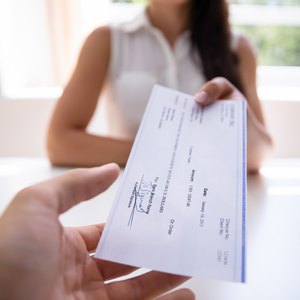
Many people may wonder, exactly how long is a check good for? Unless a check has a stated expiration date, banks will typically treat it as "expired" 180 days (approximately six months) after the issue date. Expiration dates are important, as a check issuer can't be expected to hold the money in their checking account indefinitely. Therefore, you may need to have the check reissued or pursue other methods.
Were You Issued an Expired Check?
Generally, a check with an expiration date is not valid after the amount of time listed. For example, if John Doe gave you a personal check on June 1st with the words "Void After 90 Days" embossed on the front, it is unlikely the bank will cash it on September 1st or later. However, whether or not to cash an expired check is solely within the bank's discretion.
If an expiration date is not listed, the bank will treat it as "expired" once the check is six months old, although policies vary among banks. According to the NYC Office of Payroll Administration, expired checks are also known as old or stale-dated checks. In the case of a payroll check, it is often easier to contact the employer to replace a check. If years have elapsed, you may have to claim unclaimed property from a federal agency or your state.
If you were issued a government check that has expired, such as a tax refund or Treasury check, you can have the check reissued by contacting the issuing agency. The IRS will put a trace on a stimulus payment or tax refund check before reissuing a new check. Expired checks issued by the U.S. Treasury, can be reissued by mailing the check back to the IRS. Treasury checks typically expire one year after they are issued.
How to Reissue an Expired Personal Check
If the person or business you gave the payment to hasn't cashed the check within this time, and they have contacted you to request a replacement check, you can ask your bank to issue a new payment, either online or by visiting a local branch.
Prior to replacing an expired check, contact the person you issued the check to and ask him to return it. This ensures the payee does not cash both the old and new check, receiving double payment. If you cannot reach the payee, consider placing a stop payment on the original check while you reissue a replacement check. This will prevent the bank from potentially honoring the old check after you send the payee a new one.
If you place a stop payment on the original check and fail to reissue a replacement, this may constitute fraud under the law because it suggests an intent not to pay. However, by issuing both a stop payment and replacement check at the same time, a finding of fraud is unlikely because it shows you are not attempting to avoid payment of the original debt.
If more than six months have passed and a personal check you issued has not been cashed, you can have your financial institution reissue a new check through your bank's online bill pay system or by visiting a local branch and requesting a money order or a cashier's check. Cashier's checks are typically more secure and available in higher denominations than money orders.
How to Replace Expired Cashier's Checks
If the expired check was a cashier's check, also known as a bank or certified check, visit the issuing financial institution to have a new one issued. The California State Controller recommends using cashier's checks within three years and money orders within seven years. After this period, the funds will likely become unclaimed property.
If you want to place a stop payment on the original cashier's check, doing so is at the bank's discretion. Typically, banks will only do so if the cashier's check is lost or stolen. The bank may also require you to wait a certain amount of time from the date the original check was issued before providing a replacement. A typical waiting period is between 60 and 180 days.
If your bank refuses to place a stop payment on the expired cashier's check prior to issuing a new one, confirm that it will honor the original check if presented and then advise your payee to submit that check for payment.
References
Writer Bio
Based on the West Coast, Mary Jane Freeman has been writing professionally since 1994, specializing in the topics of business and law. Freeman's work has appeared in a variety of publications, including LegalZoom, Essence, Reuters and Chicago Sun-Times. Freeman holds a Master of Science in public policy and management and Juris Doctor. Freeman is self-employed and works as a policy analyst and legal consultant.

